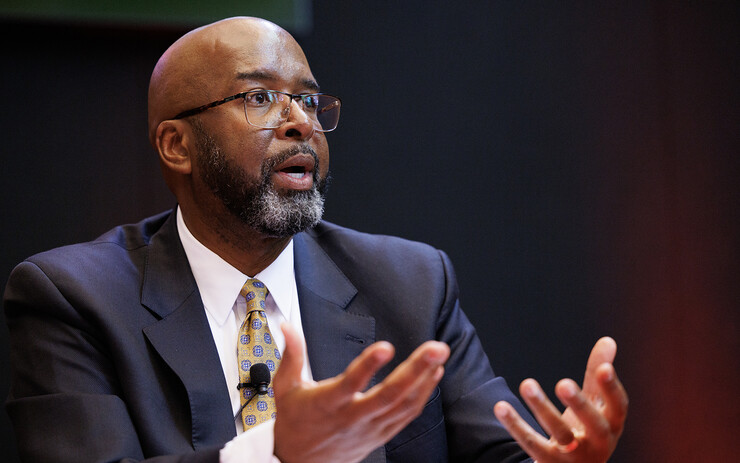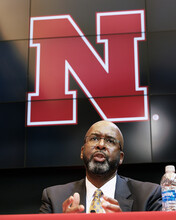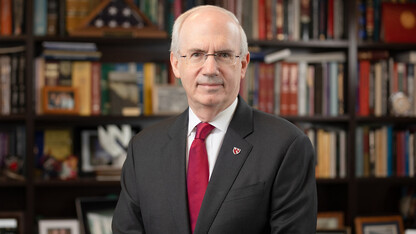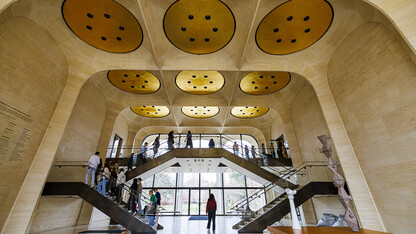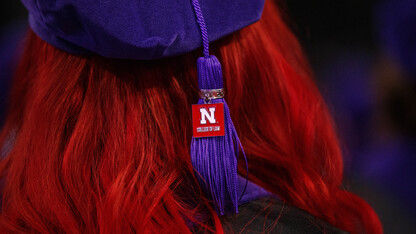· 8 min read
Bennett outlines vision for, inspiration behind desire to be next chancellor
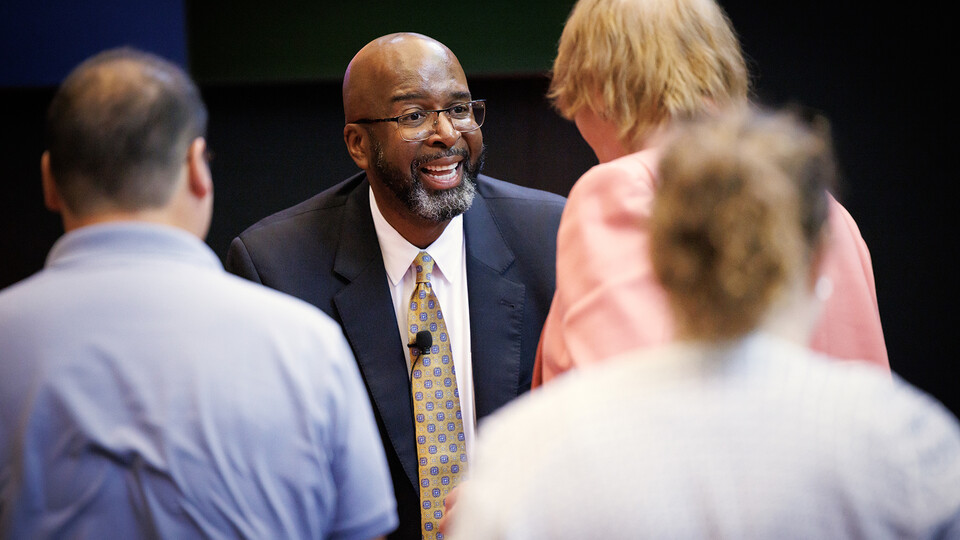
Between 17 public forums and other engagements with University of Nebraska–Lincoln stakeholders during the week of June 5, Rodney Bennett, the priority candidate for chancellor, sat down to take part in a Nebraska Today Q&A.
Bennett, the former president of the University of Southern Mississippi, was named the priority candidate in a May 22 announcement by Ted Carter, NU system president. He is currently undergoing a 30-day vetting period as required by state law. If, at the conclusion of the vetting period, Carter deems it appropriate, he will bring Bennett’s appointment for consideration at the June 22 Board of Regents meeting.
Members of the university community are encouraged to submit feedback on Bennett’s candidacy anytime during the vetting period by visiting this site.
Learn more about Bennett’s leadership vision below. Additional information about the chancellor search is available here.
What inspired you to pursue this role as the University of Nebraska–Lincoln’s 21st chancellor?
My interest in serving as the University of Nebraska–Lincoln’s next chancellor has been in the making for at least the last 12 years. I was at the University of Georgia and a supervisor asked about my career aspirations. He told me that to be successful, I would need to leave Georgia and get experience at an institution that would prepare me to serve as a leader of a land-grant institution.
Southern Miss was that opportunity, one that required a deep commitment in every category. It allowed me to learn and grow my experience and show what I could accomplish as an institution’s executive officer. This last 10 years have been a process of preparation.
During the last year, I started to think about and realize that I was ready for the opportunity to become the leader of a land-grant institution.
Why do you want to lead a land-grant university?
Early in my career I was sort of trying to predict and think about what type of impact I wanted to make. What I determined was I do my best work when I have a broad sort of platform that allows me the opportunity to not be limited by boundaries. As I worked more in higher education, those boundaries became defined by the state and how public education is governed by whatever laws the legislature creates, adopts and ultimately implements. And so, when I thought about widespread impact, I see the greatest opportunity coming through work as a land-grant institution.
It’s an amazing opportunity at a land-grant university because you’re charged with elevating all parts of the state and being responsible for education of the citizenry.
Can you talk about your leadership style and how you go about making hard decisions?
I’m a decision maker and have no trouble making difficult choices. It’s important that we make decisions quickly so the university can pivot and be more nimble to quickly address challenges we face.
By nature, I’m a collaborative person who enjoys interacting with and being around people. I hold myself to a very high standard and I pursue excellence in whatever it is that I am doing. I believe in an honest day’s work — I’m not a guy who’s at the office checking Facebook, making a grocery list, or thinking about what I will do on the weekend. I’m a person who is really focused on the task in front of me and the things I need to get accomplished that day.
I rely heavily on order and structure, on protocol, and on chain of command. And, I like dissenting opinions because a little bit of discord and considering all points of view helps us to get it right the first time.
If you become chancellor, what do you expect your strategic priorities will be in the first 100 days?
The first thing we’re going to be working on is the budget and all the related issues and concerns. After that, I’ll really need to spend some quality time meeting and getting to know the people who are influential to the university — such as members of the legislature, the regents and the governor.
I also want to get in front of alumni, key donors and our corporate partners right out of the gate. And the last thing would be to make certain we follow up on the comments and themes we’ve talked about during this public vetting period.
You mentioned being an “agent of change” throughout your career in higher education. What have been your lasting impacts in those roles and how have those experiences prepared you for this position?
Having the courage to tackle some of the systemic academic and research issues that prevented Southern Miss from reaching its full potential are actions that give me a lot of momentum and confidence.
That experience will certainly help to move those two areas here at Nebraska in the direction they need to be.
I would say streamlining the number of colleges at Southern Miss from six to four, which allowed for a tremendous opportunity to create interdisciplinary activity, will be a positive benefit for that institution for a long time. Another area of significant impact was in athletics, which included conference realignment and moving the university from Conference USA and into the Sun Belt Conference. I think that move has positioned the athletics program into a higher level of competition on the field and will generate greater fan engagement and revenue production.
And, I think Southern Miss continues to reap the benefits of my work in restoring important relationships that had been strained previously.
You’ve openly discussed expanding UNL’s research enterprise, pursuing a possible return to the AAU, and elevating Nebraska to a top 100 university nationally. Why are these aspirations important to you and the future of UNL?
They demonstrate a high level of excellence, commitment and quality that Nebraska should expect as a land-grant university and as a member of the Big Ten Conference. They are also qualities that most college students and their parents are looking for when seeking to answer the question on why they should make an investment in a university.
You experienced budget reductions every year at Southern Miss while maintaining that university’s positive momentum/growth. How will you translate that success to here at Nebraska where we face significant budget challenges?
What’s going to help is that I do not have a sense of panic.
I’ve lived in this space of budget reductions for 10 years. I’m comfortable in the space that we’re about to go into. Heck, I did my best work in the direst financial straits faced by Southern Miss since its founding. We face some tough decisions, right, but I’m not panicked about where we are.
How do you plan to balance support of faculty and staff in their varied roles supporting student success?
I think for me, it’s going to be primarily centered around my developing individual relationships with both groups. It’s hard to know how to help people if you don’t truly know what the agenda is. To further my understanding, I plan on forming those important relationships. And, I will always offer a space for people to really talk about all of the things that they need to talk about.
What is the one thing you want the campus community to know about Rodney Bennett?
The most important thing I want them to know is that I have a genuine interest and commitment to the growth, development and ultimate success of every student, faculty member or staff member.
What are your hobbies? What do you do in your free time?
Up until recently, all I really did was work. One thing I’ve committed to, moving forward, is to model an appropriate work-life balance.
I plan to discover and enjoy the uniqueness of what Nebraska has to offer. I’ve also been enjoying shore fishing lately. I love being on the golf course — but you do not want me on the team if you want to win a golf scramble. I love clay shoots and participating in them. I love sporting events and really enjoy musical, theater and dance productions. And, I love orchestra or symphony performances.
Honestly, most of what I do in my leisure time has direct connections to what I enjoy most about university life.
